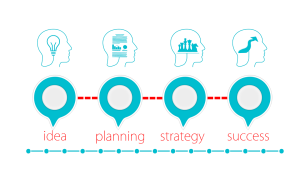Career development is a cornerstone of modern life, yet it’s often overlooked in the hustle of daily responsibilities. Consider this: most people spend 40 hours a week at work, equating to half their waking life. With such a significant time investment, it’s crucial to ensure that your career aligns with your natural strengths and values. This is where tools like the HIGH5 strengths assessment become invaluable. By identifying your top five strengths, HIGH5 provides a solid foundation for making informed career decisions, setting meaningful goals, and crafting a career path that not only pays the bills but also brings fulfillment and joy to your professional life.
Spending that much time at a job that you hate results in low life satisfaction and hinders all other aspects of your life. The answer to this sad statistic is to develop your career goals and attain the job that you truly love.
A job that pays well and takes care of you. If you are currently stuck in a dead-end job and looking to improve your life for the better, this article is just for you.
We’re going to explain what career development is, how it works, and how can you develop your own career and finally get the job of your dreams.
What Is Career Development?
Career development is the process of managing and advancing your career. It includes setting goals, planning your career path, developing skills and experience, and networking.
According to a study done in 2019 by the Bill & Melinda Foundation and Lumina Foundation, over 50% of workers in the U.S. are dissatisfied with their jobs. There are many reasons why people are unhappy with their jobs, including low pay, long hours, tyrannical bosses, and repetitive tasks.
Career development is a crucial answer to low job satisfaction, but what exactly is it? At its core, it’s a process of aligning one’s career with their unique psychological, physical, and spiritual needs. This alignment begins with self-awareness, which is where tools like the HIGH5 strengths assessment become invaluable. By identifying your top strengths, you gain insights into what truly energizes and fulfills you professionally. This self-knowledge forms the foundation of a personalized career development journey, as each individual’s strengths profile is as unique as their needs and expectations.

For example, someone who only values money doesn’t mind working long hours, and doesn’t care about the intrinsic meaning of their job, would probably choose to be a hedge fund manager. But someone who doesn’t care about money and wants to have an impact in their community would become a social worker.
So essentially, career education is a personal journey of finding yourself, and then finding the mode of being that supports what you want from life. It’s important to note that getting the dream job is not enough, because you must be sure that it’s your dream job, not someone else’s.
Because of that, career development includes heavy self-reflection and long-term decisions, which will eventually enable you to have great work-life stability and live the life you want.
Pro Tip From HIGH5
Leverage your HIGH5 strengths in your daily work. If ‘Empathy’ is one of your top strengths, seek out roles or projects where you can use this to improve team dynamics or customer relations. By aligning your work with your natural talents, you’ll find greater satisfaction and excel in your career.
How Does Career Development Work?
Career planning usually begins in early childhood. When you were young, you probably wanted to be an astronaut or a doctor. That’s because you knew these jobs and they seemed cool.
Astronauts live in space, doctors save people’s lives. However, when we get older, we quickly realize that not all cool jobs are suitable for us. What jobs we should aim for during our career development planning depends on several important factors.
Factors That Influence Career Development
There are 5 main factors influencing a career journey, which shouldn’t be ignored. Misregarding even a single factor can prove itself to be critical during your career development journey, so you should consider every single factor to guarantee that you’re on the right path.
Read every factor on this list and self-reflect for a minute, and think about how it personally influences your career opportunities.
Age
Age is probably one of the first factors you should consider when you’re planning your career development. If you’re reading this article, chances are that you’re rather young and you have enough time to pursue anything that you want.
However, if you’re pushing 70, getting a Ph.D. required to become an academic might be out of your reach.
Personal Characteristics
Personal characteristics encompass a wide range of attributes, including your personality, interests, worldview, and most importantly, your innate strengths. Understanding these aspects is crucial for career satisfaction. For instance, the HIGH5 strengths assessment can reveal if you have a natural talent for creativity or analytical thinking. If the test highlights your creative strengths, you might find fulfillment in artistic careers. Conversely, if it shows a strong affinity for numbers and logic, a career in accounting could be your path to professional satisfaction. By leveraging tools like HIGH5, you can make more informed decisions that align with your natural talents and increase your chances of long-term career success.

Financial Situation
As sad as it is, your financial situation also influences the career progression you can pursue. Even if you’re gifted and have a great academic record to enroll in a medical school, it might be too expensive for you. That’s why you have to take into consideration your financial capacities and what kind of training you can allow yourself to undertake.
Family Obligations
Your family situation is also very important to take into consideration when you’re planning your career. For example, you might have to move to another state or country to pursue your career, but if your partner isn’t willing to move together, it’ll cause problems.
Physical Shape
While physical shape mostly regards blue-collar jobs, even white-collar jobs have physical demands. For example, you might have to work night shifts or always be available on a call. If your physical condition doesn’t allow you to regularly pull out all-nighters or wake up in the middle of the night on-demand, such careers are not suitable for you.
Pro Tip From HIGH5
When considering career changes or advancements, refer back to your HIGH5 strengths profile. Look for opportunities that allow you to use your top strengths daily. This alignment will not only lead to better performance but also increased job satisfaction and faster career progression.
Career Development Plan, Strategy & Goals
Career goal-setting requires extensive planning. You have to come up with a plan of action that’s going to propel you toward the job of your dreams. The easiest way to do so is to set up a list of goals, both long and short-term and take a career skills test to find out options for your career choice.
Long-term goals are usually those that you can accomplish in 3-5 years, while short-term goals are those that you can complete in under a year. Each long-term goal is a composite of several short-term goals and even a couple of other long-term goals.
For example, if your career requires you to have a master’s degree, you first need to have a bachelor’s degree, which is a long-term goal on its own.
And to get a bachelor’s degree, you’ll have to accomplish dozens of short-term goals in the form of classes and extracurriculars. These goals usually play into two types of careers, that we’re going to overview now.
Long-Term Careers Goals
Long-term careers are characterized by several aspects. For starters, these careers require extensive training, usually in the form of university education. Then, almost all long-term careers involve multiple steps.
For example, if your dream career is to work in academia and be a tenured professor, you’ll first find yourself working as a teaching assistant, then as an assistant professor, and only then as a professor. However, even then it will take several more years to finally get tenure.
Short Term Career Goals
Short-term careers are those that don’t require extensive training and in most cases are temporary.
For example, many students work as baristas to support themselves while studying for a degree that will land them a long-term career. This type of career is most commonly a short-term goal in itself, helping you to attain your long-term goal.
Pro Tip From HIGH5
Use your HIGH5 strengths as a framework for your SMART goals. For each strength, create at least one goal that allows you to develop and showcase that strength in your current role or desired career path. This approach ensures your goals are not only achievable but also energizing and aligned with your natural talents.
Examples of Performance Metrics to Improve Career Development
Career development opportunities have many different aspects, and it’s easy to miss out on some. Leaving out even a single aspect can heavily slow down your career development or in some cases even make you fail.
To guarantee that you’re developing your career at the optimal speed, make sure you have these things under control.
Improve Performance Metrics
If you already have a job in the workplace where you want to develop your career at, make sure to always improve your performance metrics. These include quality, quantity, and productivity.
You can always improve the quality of the job that you do. Pay attention to details and always go above and beyond on your tasks to show your superiors that you’re there not just for the paycheck. To improve the quantity, you can always ask for additional assignments to do.
Finally, if you are outputting the best possible work that you can, work on your productivity. You can always find ways to improve the speed of your output, and it will greatly accelerate your career development.
Develop your Communication Skills
The development of skills is very important in career development. There’s a chance that you already possess everything you need to be promoted to your dream position, but for some reason, you’re not. That reason is your communication skills.
Maybe you just cannot communicate what you know and put your expertise into words. If that’s the case, you must develop your communication skills so you can always showcase who you truly are.
Negotiating is also a part of communication, and it’s also important for your career development. To negotiate work hours or salary, you must have perfect communication skills and obviously, leverage.
You can have leverage by getting job offers from other companies. Next time you’re going to negotiate your pay, just mention that you’re being interviewed by other companies, and you’d be surprised just how much it can impact.
Increase your Responsibilities and Duties In The Workplace
To develop your career, you must be worth it. No one is going to give opportunities to someone who’s doing just enough to get by. As we’ve already mentioned, always go above and beyond.
Ask for more work and try to get your hands on the more important projects at your job. Little by little, you’ll signal that you’re someone who’s worth considering for promotion. Develop a “go-getter” attitude and show that you’re aiming for the stars.
Develop a Growth Mindset
Most people are stuck with a fixed mindset. Such a mindset makes people believe that everything is set in stone and that they cannot improve. However, it couldn’t be further from the truth, as each human being has nearly limitless potential.
It’s only a matter of mindset. Develop a growth mindset. Believe that you can learn anything that’s required of you and work towards it. If you put your mind on something and work honestly and diligently towards achieving it, it’s only a matter of time until you’ll see your work turn to fruition.
5 Tips for Career Development for Employees
These 5 tips are going to be very helpful for your career growth and set you on the correct path of your career development.
- Set goals and create a plan to achieve them
- Develop a timeline, including milestones
- Utilize company programs
- Own your career path
- Write it down
Set goals and create a plan to achieve them
Setting up goals and creating a plan is crucial for career development, but it’s a process that requires deep self-understanding. While goals may be easy to set, accomplishing them demands alignment with your natural strengths and talents. This is where the HIGH5 strengths assessment becomes a game-changer. By identifying your top five strengths, HIGH5 provides a foundation for setting goals that resonate with your innate abilities. For example, if ‘Achiever’ is one of your strengths, you might set ambitious goals with clear milestones. If ‘Relator’ is a key strength, your goals might involve building deep, meaningful professional relationships. By basing your career development plan on your HIGH5 results, you’re more likely to set and achieve goals that feel authentic and energizing, leading to sustained career growth and satisfaction.
That being said, most goals are difficult because of the way they are formulated. To guarantee the success of accomplishing your goals, make sure they are SMART.
(S)pecific – When writing down your goal, be as specific as you can.
(M)easurable – Make a goal measurable so you can track your progress.
(A)chievable – Make sure your goal is actually achievable.
(R)ealistic – Set up realistic goals that are in accordance with your needs and desires.
(T)ime-Limited – Always set up a time frame or a deadline for your goal’s completion.
Develop a timeline, including milestones
Just like timelines are important for every single goal, they are important for your grand plan of career development & education. Imagine where you’d want to be a year, five years, and ten years later.
What kind of positions you’d want to hold at these time points? The more detailed your career development timeline is, the more likely you’re going to achieve it, so don’t be afraid to have a big milestone that you want to achieve each year.
It’ll enable you to give yourself feedback and track your progress. If you’ve missed your milestone of the year, reflect and analyze why.
Maybe you didn’t work enough, maybe you weren’t focused, or maybe something out of your control sabotaged your progress. Whatever the reason, find the source of it and try to fix it.
Utilize company programs
Many companies, especially the big ones, offer many programs to their employees. Be it a wellness retreat or a skill-improving seminar, utilize it.
Participate in as many programs as your company offers not only because it’s a free way to improve yourself, but also because your superiors will see your eagerness. Showcasing your desire to improve is almost as important as improving itself.
Own your career path
Make sure that your superiors know about your career plan. Every chance you get to talk to one of your superiors, be it during a meeting or just a random encounter during lunch, try to sway a conversation towards that.
Let them know that you own your career path. Additionally, there are people who disregard some career options as inferior. Obviously, those people aren’t very wise, but it’s important not to fall victim to such negative people.
Own your awareness of career paths. It’s chosen and designed by you and it’s a part of your identity, so you better own it. Don’t allow yourself to be scrutinized for your dreams, simply follow them and prove everyone around you wrong.
Write it down
Writing down your career education plan is a very useful trick. It might seem to be unnecessary because it’s so simple. However, many studies have shown that people who’ve written down their goals are way more likely to accomplish their goals than people who didn’t write theirs down.
When you’re just thinking about your plan, it’s not concrete, it’s just floating somewhere inside your mind. But the very moment you put it on paper, you make it concrete, you make it a part of your future reality.
Pro Tip From HIGH5
When seeking feedback or mentorship, share your HIGH5 strengths profile with your supervisor or mentor. This will help them provide more targeted advice and opportunities that align with your natural talents, accelerating your career development.
Career Growth Vs. Career Development
| Career Growth | Career Development |
| Focuses on your professional achievements | Focuses on your developing personal strengths and achievements |
| Focuses on your goal | Focuses on the method and the way you accomplish the goal |
| Strives to reach a higher position or status than your current one | Involves improving your personal strengths, skills, and qualities within your current job/status |
| It requires a strategic approach. | It involves personal and professional transformation. |
Can Career Development Foster Employee Commitment?
Career development can foster employee commitment. Most companies have a designated specialist in HR who makes sure that every employee in the company has their own career platform path and helps them to follow it.
Employees who feel the support from their companies are always more committed than those, who do not.
Why Career Development is Important?
Most people spend half of their waking lives at work. Because of that, it’s not surprising that career development is important.
Developing your career makes you more satisfied with your job, creates something to anticipate in the future, and makes you happier. Being stuck in a dead-end job with no prospects is no fun at all, and career development can solve that easily.
Overall Conclusion Of Career Development
Career development & education is something that everyone should take into consideration, regardless of age. Whether you’re young or old, it’s never too early or too late to construct a plan for your career education.
Having a job that you love and that is a great fit for your lifestyle and worldview will increase your overall life satisfaction and make you a better person. When you’re happy with your job, you are happy in other areas of your life and also make the lives of everyone around you better.
Despite what some people might say, focusing on your career is not shallow. Your career takes up the majority of your time, so it’s only wise to make the best of it.
Case Studies, Academic, and Research-Based Sources:
- Career Development in Organizations and Beyond: Balancing Traditional and Contemporary Viewpoints” by Hall, D.T. & Associates (2002). Human Resource Planning.
- The Protean Career: A Quarter-Century Journey” by Douglas T. Hall (2004). Journal of Vocational Behavior.
- The Boundaryless Career: A New Employment Principle for a New Organizational Era” by M.B. Arthur & D.M. Rousseau (1996). Oxford University Press.
- Career Development and Systems Theory: Connecting Theory and Practice” by Patton, W., & McMahon, M. (2006). Sense Publishers.
- The Role of Employee Engagement in Work-Related Outcomes” by Harter, J.K., Schmidt, F.L., & Hayes, T.L. (2002). Journal of Applied Psychology.
- The Impact of Career Development Programs on Employee Turnover: A Case Study” by Smith, A. (2018). Journal of Business Case Studies.
- Understanding Career Development: A Convergence of Perspectives” by Savickas, M.L. (2005). Journal of Counseling & Development.
- The Influence of Career Identity and Social Networks on Career Transition Magnitude” by Sullivan, S.E., & Baruch, Y. (2009). Journal of Vocational Behavior.
- Linking Career Development Practices to Turnover Intentions: The Mediator of Perceived Career Success” by Greenhaus, J.H., Parasuraman, S., & Wormley, W.M. (1990). Journal of Organizational Behavior.







